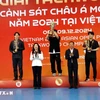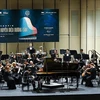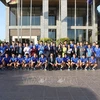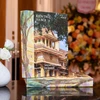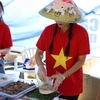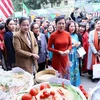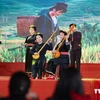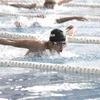About 400 artefacts belonging to the Bronze Age culture of Vietnam are being displayed in an exhibition in the Jeju National Museum in the Republic of Korea (RoK).
The event is part of a special display titled "Early Days of Vietnam Ancient Culture – Dawn on the Hong (Red) River", according to the owner of the exhibits, the Vietnam National Museum of History.
The exhibition, which will run until September 10, focuses on three topics: Pre-Dong Son Era's cultures; Hong River and Dong Son Culture; and the Cultures of the Metal-Using Era in Central and South Vietnam.
The exhibition highlights major features of the Dong Son culture which existed from 7000BC to AD100.
Dong Son is regarded as a distinctive Bronze Age culture, principally on the basis of archaeological finds. It developed directly from the pre-Dong Son cultures on the banks of the Hong, Ma and Lam rivers in North Vietnam.
"Visitors will get a deep insight into the origin, date, forms and locations of remains and relics; the material and spiritual life of the Dong Son people; the social divisions, conflicts and wars in the Bronze Age which prove that the material civilisation of the Dong Son culture was the premise and foundation of the first state in Vietnam's history, the State of Van Lang," said Nguyen Quoc Huu, Deputy Head of the Vietnam National Museum of History's Display Division.
The exhibits include bronze drums, large bronze bucket-shaped vessels, jewellery, working tools and hunting instruments.
"The metal-refining and bronze-casting techniques of the Dong Son people were of high quality. Bronze drums and large jars were skilfully carved with fine patterns," said Huu.
"The techniques of refining metals and bronze casting were the key economic industries of the Dong Son citizens. They led to a breakthrough, economic and social, and changed the culture for the better in comparison with the pre-Dong Son cultures."
Items from the cultures of Sa Huynh in the central region and Dong Nai in the southern region as well as those showing the relationship and interaction between these cultures are also on display.
The event aims to encourage RoK people and other foreign friends of Vietnam to learn about the history and ancient culture of the country, and to promote the relationship between Vietnam and RoK.
After September 10, the exhibition will move from the Jeju National Museum to the Naju National Museum in RoK’ southwest.-VNA
The event is part of a special display titled "Early Days of Vietnam Ancient Culture – Dawn on the Hong (Red) River", according to the owner of the exhibits, the Vietnam National Museum of History.
The exhibition, which will run until September 10, focuses on three topics: Pre-Dong Son Era's cultures; Hong River and Dong Son Culture; and the Cultures of the Metal-Using Era in Central and South Vietnam.
The exhibition highlights major features of the Dong Son culture which existed from 7000BC to AD100.
Dong Son is regarded as a distinctive Bronze Age culture, principally on the basis of archaeological finds. It developed directly from the pre-Dong Son cultures on the banks of the Hong, Ma and Lam rivers in North Vietnam.
"Visitors will get a deep insight into the origin, date, forms and locations of remains and relics; the material and spiritual life of the Dong Son people; the social divisions, conflicts and wars in the Bronze Age which prove that the material civilisation of the Dong Son culture was the premise and foundation of the first state in Vietnam's history, the State of Van Lang," said Nguyen Quoc Huu, Deputy Head of the Vietnam National Museum of History's Display Division.
The exhibits include bronze drums, large bronze bucket-shaped vessels, jewellery, working tools and hunting instruments.
"The metal-refining and bronze-casting techniques of the Dong Son people were of high quality. Bronze drums and large jars were skilfully carved with fine patterns," said Huu.
"The techniques of refining metals and bronze casting were the key economic industries of the Dong Son citizens. They led to a breakthrough, economic and social, and changed the culture for the better in comparison with the pre-Dong Son cultures."
Items from the cultures of Sa Huynh in the central region and Dong Nai in the southern region as well as those showing the relationship and interaction between these cultures are also on display.
The event aims to encourage RoK people and other foreign friends of Vietnam to learn about the history and ancient culture of the country, and to promote the relationship between Vietnam and RoK.
After September 10, the exhibition will move from the Jeju National Museum to the Naju National Museum in RoK’ southwest.-VNA











